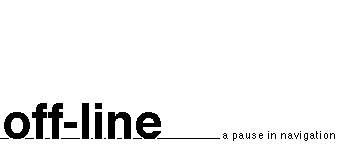The more I hear and read about the “new economy”, the less I understand. In past years I felt that we knew what we meant. Of course it’s a complex, turbulent and largely unpredictable evolution; but we had a reasonably clear perception of what it is (or so I thought). Now those words are used to mean so many different things that we seem to have lost sight of any perceivable direction. We should, I think, step back and try to understand how and why the concept of a “new economy” was developed in the first place – about three years ago, but in the context of some earlier thinking.
Maybe the discussion would be less confused if someone (I wonder who) hadn’t come up with the notion of an “old economy” and the resulting scenario of some sort of war between two opposed armies, two separate human species. One that sees itself as “advanced”, innovative, driven by technology; the other that feels more comfortable with traditional expertise, common sense and relationships based on people, not computers. If two such cultures existed (to some extent they do) both would be confused about what’s happening and about the real thrust of the “new economy” – or whatever is the change in which we are living.
That there is a change was quite clear twenty years ago. Almost everyone agreed that we were entering the “information age”. The “third wave” wasn’t just a book a by Alvin Toffler but a widely shared perception. Agriculture tied us to the land and set the pattern for the rules and behaviors that are still in force. Industry brought mass production of goods, availability to many (but not to all) of things that didn’t exist or were only for a few privileged people – but also a sharp and cruel separation between those “masses“ that could share in the abundance and those that still can’t. It also led to a massive centralization and flattening of information and culture.
Of course new waves don’t wipe out the old. Manufacturing didn’t eliminate farming; industry doesn’t disappear in the information age. But the focus had shifted from land ownership to production facilities and now is shifting to information as the controlling force. There were high hopes. This is how Jean-Jacques Servan-Schreiber described the new wave in 1980.
In the post-industrial era the perennial “finiteness”, that oppressed us and imposed its law, is broken. Within the reach of men is, at last, the infinite resource, the one: information, knowledge, intelligence.
It that a dream? I don’t think so. It’s really possible. It hasn’t happened, so far, because we haven’t really entered the new era. We haven’t had the time (or the will?) to use the new resources to improve our “quality of life”. The equipment is there, bout human culture doesn’t evolve and adjust so quickly.
But in the meantime something has changed. Twenty years ago nobody imagined that there would be such a widespread availability of personal computers. The internet existed, but most people weren’t aware of it – or didn’t believe that it could be as widely accessible as it is now.
So here we are; there is more to the “information age” than could be perceived twenty years ago. Where networks prevail over mainframes, there is a radical change that isn’t just technology. The new phase of society (and economy) is based on networks of people and sharing of knowledge. The network economy changes the patterns and the focus; there is a new ecology, a changing biological environment.
Again we can “dream” about human roles in this perspective. Exactly three years ago, (September 1997) in an article that later became a book and is a point of reference for the so-called new economy, Kevin Kelly said:
The wonderful news about the Network Economy is that it plays right into human strengths. Repetition sequel, copies and automation tend toward the free, while the innovative, original and imaginative soar in value.
Is this another dream? No. It’s a picture of things that can happen. But it takes time; and a change in culture, including an understanding of the ancient, pre-industrial roots of this new environment.
This isn’t a war. It’s evolution. Of course evolution isn’t smooth; there are conflicts. But while in “natural” evolution countless living creatures are killed and species risk extinction, this social and economic change can take place with no destruction of human lives, cultures or ideas. We can evolve into the “new” without losing any values of the “old” if we feel that they fit our needs and desires. We can re-discover “old” ways of living and thinking that we thought were lost. But that takes a big investment in human abilities, culture and imagination. It needs freedom, diversity, mutual respect, sharing of experience and knowledge. We can call this “new economy” – or by any another name if it fits the purpose more clearly. The key point is that it’s based on human values; and if those aren’t cultivated with care technologies are useless – when they aren’t a hindrance.



